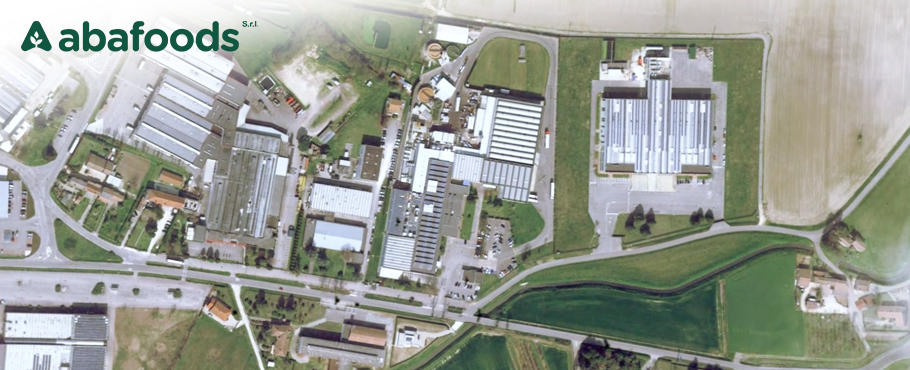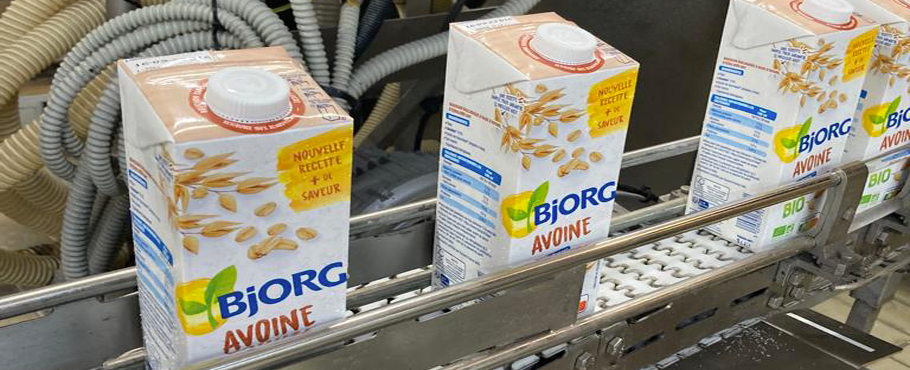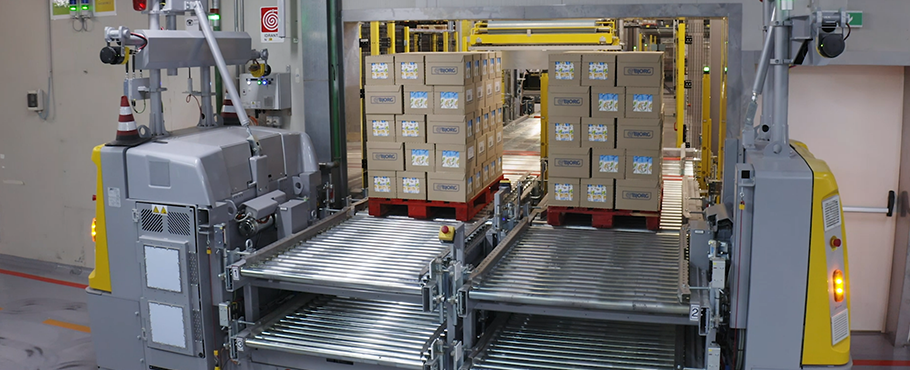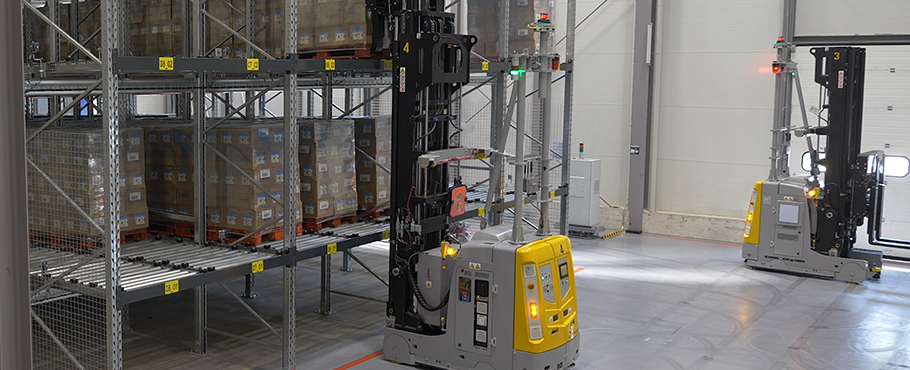How to find a reliable, scalable, end - to - end solution in tight spaces?

Faced with the need to increase production capacity, many companies think of investing in a greenfield site in order to maintain their market share and avoid potential production shortfalls generally caused by modifications to the existing plant.
Nevertheless, the construction of a new factory requires major investments and involves extended construction times.
So how can a company increase its productivity through an optimized investment and a faster time-to-market by investing in the redevelopment of a brownfield?
E80Group Abafoods Interview from E80 Group on Vimeo.
In the case of Abafoods the answer is clear. Thanks to a close collaboration with Tetra Pak and E80 Group, the company has effectively increased its production capacity by 20%. Ambitious targets have also been achieved, like a 15% reduction in film consumption and a 50-ton reduction in CO2 emissions in parallel with an 8% increase in product-on-pallet and a 50% increase in automatic product management. Around 400 m² of space has been cleared for a potential future expansion of the production lines, and safety levels have significantly improved too in the whole plant. "The solution designed by E80 in collaboration with Tetra Pak and Abafoods is extremely efficient and flexible, since future expansion in production lines or changes to the line layout will only require the re-routing of LGVs instead of dismantlement or the construction of new floor-mounted structures for material movement. It has improved the efficiency of all our intralogistics operations and reduced our environmental impact, too," explains Luca Europeo Ecotone’s Operations Director Italy.
The objectives of Abafoods
Founded in Italy in 1993, Abafoods has its HQ in Badia Polesine (Italy) and is a member of Ecotone Group. Today, the company is one of the European leaders in the production and distribution of plant-based beverages and creams alternative to milk and dairy products.

Ecotone Group, whose HQ is based in Lyon, is on a mission to encourage biodiversity through brands like Isola Bio, Bjorg, Allos, Alter Eco, Bonneterre, Clipper, Danival, Destination, El Granero, Kallø, Whole Earth and Zonnatura. In 2019, Ecotone Group became the first European food company to obtain B Corp certification. The companies in the group are based in six European countries, employ a total of 1600 people, and recorded a turnover of 725 million euros in 2021.
The investment made by Ecotone at its Italian site has allowed production to remain as close as possible to the areas where the necessary organic raw materials are grown and has achieved an increase of 27 million litres of plant-based drinks a year, equivalent to 20% of capacity at the same time. "This strategic investment is intended to reinforce the industrial competitiveness of Ecotone in a growing market for plant-based drinks. Ecotone has a significant presence in Europe and is committed to respect its core values and promote greater innovation and sustainability in the food industry. I would like to thank all the teams involved for their tireless work over the past three years. Thanks to them, this project has been a great success and our Badia Polesine factory has become a point of reference for European industry", declares Christophe Barnouin, CEO of Ecotone.
The Abafoods plant, which produces organic plant-based drinks for brands like Isola Bio, Bjorg, Bonneterre, Abbott Kinney's and EcoCesta had reached the limit of its capacity with four processing lines but the demand was still growing.
"The aim of the project was to increase production by implementing a flexible solution that could be integrated with our digital infrastructure, without any operations downtime. Work therefore had to be done selectively to continue serving customers and consumers while the site was gradually being transformed. The solution had to boost intralogistics efficiency and improve safety on site. And because our factory is relatively small, existing space had to be thoroughly optimized. Right from the planning stage, a great deal of attention was paid to choosing the layout to make sure that changes were completely ‘future-proof’ and able to sustain growth over time in a logical way ", states Luca Europeo.
Abafoods turned to Tetra Pak and E80 Group to develop an integrated solution capable of increasing production capacity, prioritizing safety, eliminating bottlenecks, improving efficiency and flexibility and satisfying current and future demand without having to expand the plant.
Abafoods in Badia Polesine currently employs 163 people and occupies a production site of 14,000 m², one of the largest of its kind in Europe. Every year, five production lines make it possible to produce 120 million litres of plant-based beverages, most of which are destined to France, where the Ecotone Group makes the majority of its turnover.
The solution
In response to the request from Abafoods, Tetra Pak and E80 Group put together a team of experts to design and develop an integrated and customized solution to automate the end of line in a particularly tight space.
The first big challenge was to free up enough room for the additional production and packaging lines needed to achieve a 20% increase in output in as little time as possible.
To optimize space for all the packaging lines and for E80 Group’s new palletizers, wrappers and labellers, Tetra Pak first repositioned its machines within the existing area using a new layout validated by the 3D mapping technology. This advanced tool creates a virtual model of an existing factory and determines the ideal systems, thereby avoiding unnecessary problems in the installation phase. 3D mapping produces a precise plant layout and identifies all the important elements within the factory, including hidden ones.
"The complexity of the project required end-to-end teamwork from our partner E80 Group right from the planning stage. Flexibility and adaptability were key to the success of this project. The experience of our engineers, combines with the latest 3D mapping technology for simulating the impact of layout variations, along with close collaboration with Abafoods and all our suppliers proved invaluable as we selected the most compact and efficient machinery. The same applies to the interconnection of our equipment with the customer’s ERP", explains Giulia Drusiani, Account Manager at Tetra Pak. "Thanks to great teamwork and excellent planning, we managed to deliver a really complex project. We changed the layout for secondary packaging on four lines by installing a new end-to-end line with no impact on the continuity of production. Instead, we managed to achieve the efficiency goals required by Abafoods”.
Thanks to SmartDesigner tool, a discrete-event simulation software modelled and integrated in E80 Group logic, we managed to compare and check the functioning of different solutions while optimizing processes at their fullest.
"This tool allowed us to simulate factory flows for Abafoods and evaluate current and future operating scenarios. Pressure testing at the system design stage helped us to identify the most efficient intralogistics solution with 95% certainty, while fulfilling in advance future production increases and a subsequent plant expansion. We guarantee this kind of continuity for the entire life cycle of the plant", explains Giuseppe Cassano, Key Account Manager at E80 Group. "Two tools, 3D Mapping and SmartDesigner, enabled us to develop, implement and guarantee – right from the design stage – a fully customized, reliable and modular system with optimized space. From palletizer to wrapper, and through to truck loading, we were able to identify and eliminate all potential bottlenecks in order to guarantee total plant efficiency over time".

Operator safety on the workplace was another important objective. The use of automatic laser-guided vehicles transformed semi-manual operations into centrally automated, integrated and controlled processes, eliminating risks on: products, people, equipment and structures. Thanks to integration between the SM.I.LE80 software platform and Abafoods’s ERP, efficient flows are now ensured from raw material reception to finished product shipment.
"The use of LGVs significantly reduced interference between forklifts and pedestrians and has therefore reduced the risk of accidents too. The new layout, designed with the help of E80 Group and Tetra Pak, and the use of LGVs has allowed us to eliminate a critical bottleneck in the flow of materials, caused by the movements of forklifts from the warehouse to the production building to collect finished products", Luca Europeo explains.
"As for future changes and expansion", Cassano continues, "thanks to increasingly innovative modular solutions we can change and add functionality almost as if the factory were built with Lego® bricks. Everything will continue to be optimized and managed by our LGV and software".
The results of the project
The needs of Abafoods have been fully satisfied thanks to Tetra Pak and E80 Group’s technology, know-how, expertise and complete hardware and software portfolio, consisting of end-to-end solutions from raw materials reception to processing, packaging, end-of-line and warehousing.

With this new solution, Abafoods can concentrate on the objectives of continuous improvement and increasing its market share.
The joint mission of Tetra Pak and E80 Group is to help companies to grow and improve their production and performance while ensuring the safety of personnel.
"Like all conventional manufacturers, we used to move pallets twice, first storing them in the warehouse and then loading them onto trucks. With this new solution, we have integrated and improved our intralogistics, including our automated staging operations, and move pallets just once. We now have a completely automated pallet flow for our main SKUs and customers right up to truck loading. This has improved the efficiency of all our operations as well as reducing our impact on the environment. As far as ROI is concerned, let me give you some figures. If we had built a new production plant, we would easily have spent 5-6 million euros. Instead, with this project we invested only 1.5 million in infrastructure. And we have not only optimized existing space but also installed a fully automated and integrated solution without having to stop production", concludes Luca Europeo.
